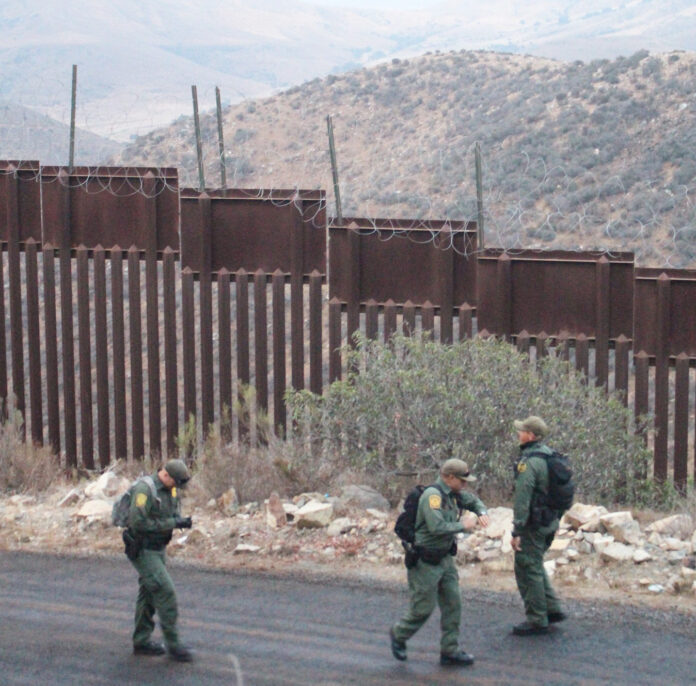On March 18 a group of local organizations spoke at a virtual conference about the current situation at the San Ysidro-Tijuana border and called for action in discontinuing federal statute Title 42, which prevents refugees, asylees, and migrants from legal entry into the United States. The call for discontinuing the statute’s enforcement comes as a result of increased migration to the U.S. by Ukrainian refugees seeking safe harbor from a February Russian invasion of their homeland.
Lawyer Kate Clark, senior director of Immigration Services, Jewish Family Service of San Diego said in 2017, immigration advocated, organizations, and the community came together to form the San Diego Rapid Response Network. JFSSD plays a central role in the SDRRN alongside core partners as the ACLU of San Diego and Imperial counties, in addition to more than 40 general organizations. Central to the Network’s mission is an emergency hotline where individuals can call to report ongoing immigration emergencies, akin to an emergency 9-1-1, said Clark.
“All guests released into JFSSD’s care by the Department of Homeland Security, regardless of their country of origin, are going through the legal process of seeking asylum in the U.S.,” she said. “The SDRRN migrant shelter services has assisted more than 58,000 people providing respite shelter and helping them reunite with loved ones across the U.S. These people would have otherwise been released by federal authorities on the streets of San Diego without food, shelter, transportation, or other support and resources.”
Clark said while migrants are in its care, guests receive case management, travel, financial, and legal support as needed. They receive COVID-19 testing and health screenings. Guests also have the option of receiving COVID-19 vaccines.
“Importantly for the entire COVID-19 pandemic, we have demonstrated that it is both possible to prioritize public health and welcome vulnerable individuals with dignity and respect,” Clark said. “JFSSD is committed to helping refuges, asylees through our shelter system and legal work.”
Clark said the invasion of Ukraine has forced millions of Eastern Europeans to flee their home as violence escalates and civilian’s populations become increasingly at risk. These individuals join roughly 80 million displaced people around the world who remain in immediate danger fleeing war, persecution, and danger.
“Since the start of 2022, we have assisted more than 453 Ukrainian individuals and 1,023 Russian individuals, nearly all families with young children, through the SD Rapid Response Network Migrant Shelter Services. This is compared to a total of 878 individuals from Ukraine and 6,946 individuals from Russia served in calendar year 2021. Our recently arrived guests from Ukraine tend to be female heads of household with their children. Our guests have shared that their spouses have stayed behind to fight Ukraine’s continued independence, with many of them being informed that their spouses who stayed behind have been killed due to Russia’s invasion of Ukraine.”
Clark said they anticipate an increased number of people coming from Eastern Europe as asylum seekers, but the process is quite lengthy and can take years.
“As committed as we are in helping these new arrivals who deserve nothing more than to find safety after all they have endured, we cannot forget about the tens of thousands of other asylum seekers from around the world who remain stranded at our southern border because of cruel and inhumane policies like Title 42 and “Remain in Mexico”,” she said. “In the coming days as the plight of Ukrainians and other Eastern Europeans continue to unfold, among many other conflicts and humanitarian crises around the world, JFS stands at the ready to welcome the stranger. We call on the U.S. government to immediately end these policies and to stop inhumanely expelling asylum seekers and migrants arriving at the southern border. Together we must work with all forms of government as a community to invest in infrastructure and process asylum seekers at the border. It is what our country was built on and deserves. We are preparing for Title 42 and Migrancy Protection Protocols to no longer be our reality.”
Based in Tijuana, Erika Pinheiro, Litigation and Policy director at Al Otro Lado said it has recently been providing Notes of Rights presentation, accompaniment and humanitarian services for refugees in Tijuana, including Ukrainian refuges seeking safety in the U.S.
“The issue with Eastern Europeans coming through Mexico and San Ysidro did not start with the invasion of Ukraine,” she said. “Over the past year or so, we have seen a large increase in Russian and Ukrainian asylum seekers coming through Tijuana. We saw the biggest increase in January and February. To give you a sense, there are about 30,000 Russians and 10,000 Ukrainians traveling through Mexico during January and February. Twice as many that had come through at the same time last year.”
Pinheiro said more people are coming through now since the invasion of Ukraine, but that this population has been coming through the region for some time.
“Title 42 has been in place for that entire period,” she said. “There have been no legal means for that population and other nationalities to seek asylum in the U.S. Russians and Ukrainians tried to enter the U.S. through car lanes to claim asylum when they hit the inspection booth. In response to this, California Border Patrol increased enforcement to prevent these asylum seekers from ever reaching U.S. soil, turning the cars around into Mexico.”
Pinheiro said the first large wave of people fleeing the Ukrainian conflict began over the past couple of weeks.
“A week ago, I met my first Ukrainian family, a mom with three children,” she said. “She previously tried the car lane route and was turned away. One of our volunteers was at the port of entry. We had to submit a written request for a humanitarian exemption from Title 42. It took about 24 hours for her to be approved and then she was admitted with her three children.”
Pinheiro said the situation at the border is confusing, especially with Ukrainians trying to cross the border.
“We saw families being turned away,” she said. “We saw Russians and Ukrainians being admitted on an ad hoc basis. We saw Russians, Ukrainians, and people from Belarus sleeping outside the port of entry, waiting days to be admitted. There were no clear guidelines on how people could seek safety in the U.S.”
Pinheiro said around March 15, they began seeing Ukrainians admitted with the humanitarian parole, with CBP processing Ukrainians on arrival and issuing a one-year humanitarian parole document.
“When we spoke to clients who had gone through, we saw that they were being asked if they would return to Ukraine after the conflict was over, and they said yes. There was a memo issued by DHS for CBP to issue a humanitarian exemption under Title 42 yesterday,” she said.
Pinheiro said CBP can do that for any nationality and that it makes humanitarian exemption requests frequently, but the memo did not specify what could be done in response to Ukrainians.
“That does not give us a clear process,” she said. “It does not tell people whether they should go to the port of entry, now they can access that process, so there is still a lot of confusion on the ground. What we saw after the memo was that Russians were being admitted anymore. As of a few days ago, we started seeing between 20 and 50 Russian nationals as well as people from Belarus sleeping outside the port of entry waiting for their chance to be admitted.”
Pinheiro said people do not know who to trust, and in going to the port of entry to see Russian individuals, they are anticipating being admitted to the U.S. and are resisting leaving the port of entry.
“On March 16, Tijuana municipal authorities issued a letter in Russian telling people that they needed to leave the port of entry, or they risked CBP having to close the port of entry entirely,” she said. “Mexican authorities offered to bring the Russians refugees to a federal shelter, but it is very far from the port of entry, so most refused to leave, and as of last night they were still sleeping there. There were elderly folks, pregnant women, medically vulnerable people, as well as children sleeping outside the port of entry.”
Pinheiro said every single person she spoke with from Russia were either working in opposition to Russian President Vladimir Putin for the invasion, most of them arrested after protesting the invasion of Ukraine shortly after it began. She said it anticipates seeing more people leave Russia as the invasion continues, and though they are being made to wait, she saw they were treated differently from other nationalities coming through the port of entry.
“What I have heard is CBP tends to be more polite or tell them to wait,” she said. “They converse with them like human beings. But when we see Central American or Black migrants reaching the point of entry, they are told to leave. They are screamed at. They are told they cannot access at all. We need more reliable information from the government as to how and whether Ukrainians, Russians and other Eastern Europeans nationals can access the asylum system to prevent people from taking dangerous risks to enter the U.S. in an irregular manner.”
Margaret Cargioli, directing attorney, Immigrant Defenders Law Center said during one of the most difficult times in history, the U.S. government continues to expel families and individuals who merit asylum, from experiencing danger in their country of origin or Mexico.
“Asylum seekers at the border are human beings for LGBTQ, victims of domestic violence, or political asylum seekers. Returning fleeing folk to danger without an opportunity to pursue asylum in the U.S. is cruel and unlawful,” she said.
Cargioli said during the Biden administration, Human Rights First has documented at least 9,800 kidnappings, torture, rape, and other violent attacks on people blocked or expelled to Mexico due to the Title 42 policies. She said the large numbers of violence at the border are directly related to Title 42, and because of Title 42, human traffickers and cartel are drawn to the border to target vulnerable people and left stranded.
“IDLC has spoken to hundreds of people that are in distress or life-threatening situations at the
border. They fled persecution in their home countries and upon reaching the U.S. border are now left without an option to seek asylum in the U.S. Many have been threatened or robbed by Mexican officials or kidnapped by the cartels,” she said.
Esmeralda Flores, immigrant rights and binational affairs advocate, ACLU San Diego & Imperial Counties said people fleeing persecution and violence have the human and legal right to seek asylum in the U.S.
“The Trump administration’s effort to dismantle our asylum system has resulted in human suffering,” she said. “Trump era policies that remain in effect today, mostly Title 42 and remaining in Mexico perpetrates our governments violation of those fundamental rights. It is a national disgrace, and this Sunday marks a grave milestone. It is the second-year anniversary of Title 42. As it is a public health order, it uses the COVID-19 pandemic as an excuse to expel migrants seeking protection at the U.S. border. For nearly two years, this cruel and unlawful policy has returned people to the land where they are threatened. It is clear that this policy has never been about public health, but the Biden administration is still using it to block the border from those seeking protection, while at the same time, issuing travel restrictions for others.”
Flores said that Title 42 has had a disproportionate effect on Black, Latino, and LGBTQ migrants, and since September 2021, the Biden administration has expelled more than 14,000 cases. Many under Title 42.














